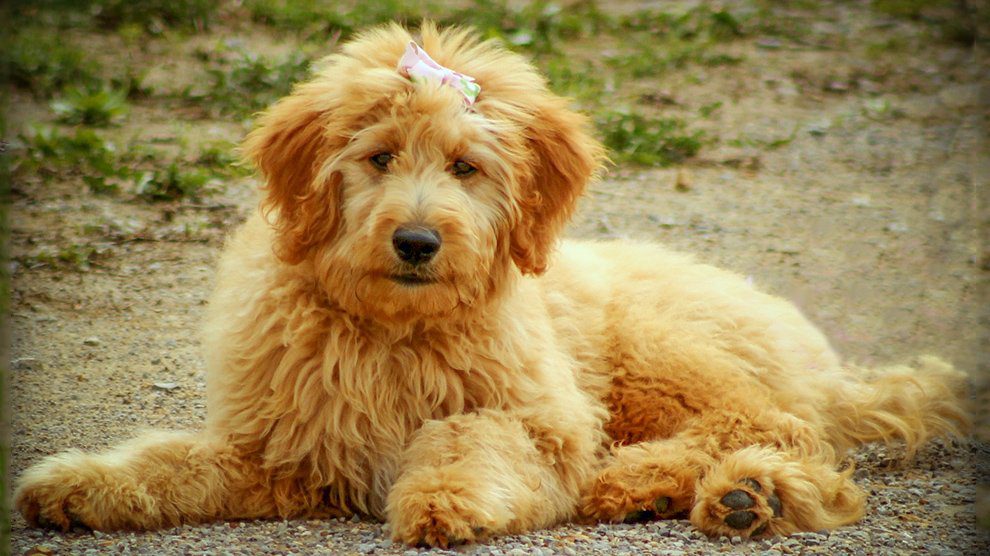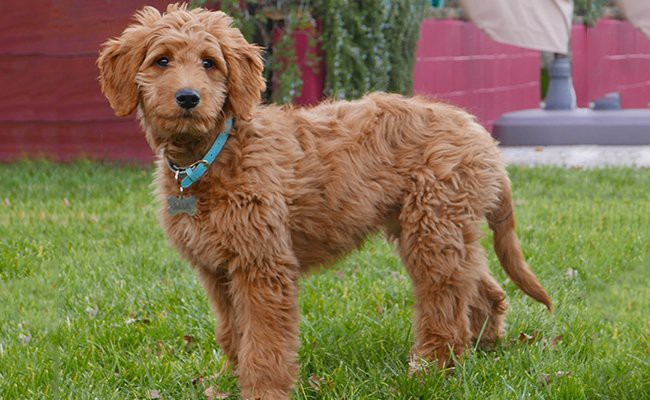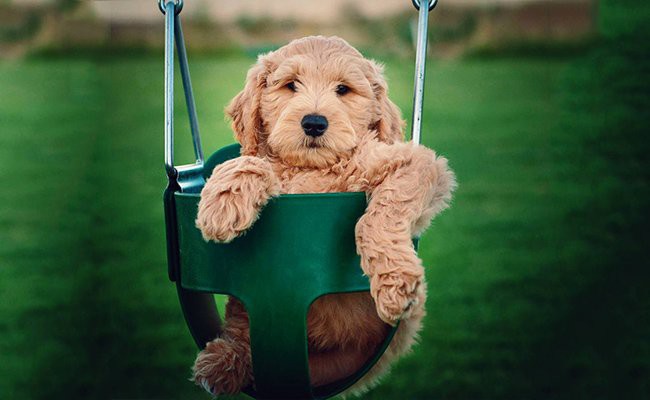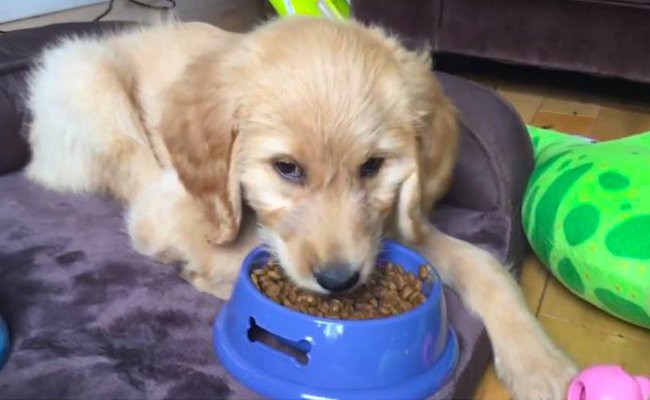Dog Pregnancy Calculator And Timeline
The cute Goldendoodle is a crossbreed dog between Golden Retriever and Poodle. It served as a guide dog to help visually affected individuals with allergies during the early 1990s. The salient feature of this breed is – they do not shed and this largely decreases the problem of dander.
Since it is a cross breed, it is not recognized as a unique dog breed by registered kennel clubs, like AKC.
Goldendoodle Breed Characteristics Sheet
- Origin: United States of America
- Size: Medium
- Dog Breed Group: Working
- Purebred: No
- Lifespan: 10 to 15 years
- Height: 15 to 20 inches
- Weight: 50 to 90 lbs
- Coat Appearance: Soft, Wavy, Curly
- Coat Colors: Red, Black, Brown, Gold, Apricot, Cream, Chocolate, Gray
- Temperament: Affectionate, Playful, Intelligent, Happy, Outgoing, Obedient
- Good With Children: Yes
- Intelligence Level: High
- Good With Pets: Yes
- Hypoallergenic: Yes
- Grooming: Less
- Shedding: Low
- Barking: Moderate
- Suitable For Apartments: No
- Need For Exercise: High
- Easy To Train: Yes
- Good For First Time Owners: Yes
- Health Issues: Hip Dysplasia, Atopic Dermatitis, Patellar Luxation, Progressive Retinal Atrophy, Addison’s disease, Gastric Torsion
- Litter Size: 3 to 8 puppies
- Average Price: $1500 to $5000
Goldendoodle Puppies Facts
Coat Color
The puppies appear in coat colors like gold, apricot, cream, black, brown, red, chocolate and grey. They are also seen in party colors, which means that they appear patchy. The coat type and color will change as the puppies grow older.
Appearance
Since it is a designer dog, it has a combination of features in its appearance. Two extreme levels of appearances can be spotted in the Goldendoodle puppies.
It can be bulky to look with a coat, which is straight like a Golden Retriever. Yet, the puppies appear with a wavy coat like that of a Poodle and look thinner in size.
They are medium built with a soft wavy to curly coat. They have a medium round-shaped head and large, soulful, expressive and impressive eyes.
These dogs have ears, which are set high, and they drop close to the side of the dog’s head. Based on the genes of their parents, the Goldendoodle puppies appear in small, medium or large size.
F1 Goldendoodles and F1b Goldendoodles
F1 Goldendoodles, first-generation hybrids are bred from a Golden Retriever and Standard poodle. They have the highest level of hypoallergenic quality acquired from the parents. They have a more curly and wavy coat type.
F1b Goldendoodles are bred from F1 Goldendoodles and Poodles. They posses two-third of the hypoallergenic quality from the poodles. They have very curly hair and they look a lot like poodles. They weigh between 40 to 50 pounds. The average height maybe 15 to 20 inches.
F2 Goldendoodles – They are the second generation dogs. When two Goldendoodles are bred, you get F2 Goldendoodles.
Miniature Goldendoodle or mini doodle is an outcome of a Toy Poodle and a Golden Retriever.
Goldendoodle Size And Lifespan
How big do standard Goldendoodles get?
Mostly, the Goldendoodle dogs are small to medium built. On average, they weigh 14-20 kg while their average height is about 13 to 24 inches.
Small or miniature Goldendoodle weighs between 7 to 14 kg. A standard dog will weigh between 20 to 45 kg.
Lifespan
Goldendoodles live till the age range of 10 to 15 years. However, this is only applicable for dogs with sound health.
The key contributors to the stated lifespan of a Goldendoodle are food habits, exercises or therapy, and happy living conditions.
Goldendoodle Care
It is your ultimate responsibility to take care of your intelligent family companion. Proper care can keep your dog to stay healthy and increase its life span.
Care is needed right from its food to exercise needs.
Goldendoodles are generally mischievous dogs and good chewers, too! They will chew even little objects such as electrical cords and choking hazards.
And, they will play with the things they grab with their mouth.
So, below are a few basic tips to take care of your dog.
Warnings
- Keep the important things in your home, irrespective of their size, out of reach. This will prevent your dog from chewing hazards.
- Identify and remove the poisonous plants inside the home and from the backyard. Else, keep them out of reach.
Goldendoodle Training
Normally, the Goldendoodle dog breed will respond well to positive methods of training and does not like rough methods. The trainer/owner of a dog will succeed in every training session if they give rewards and encouraging words to their dog during its training.
Since the Goldendoodle is a highly energetic and attention-seeking dog, so it will perform well in the obedience training and agility training. You can play activity games with your pooch to make him engaged and happy.
The agility courses will develop the bondage between the dog and its owner and make the dog shed out as much energy. Likewise, the athletic nature of this dog will make it display its skills and socialize with other dogs.
Goldendoodle Exercise
Goldendoodles are playful. So, daily exercise for about 20 to 30 minutes will keep them physically and mentally active. But, knowing the kind of exercise needs will avoid destructive behaviors in them.
- Take it for daily walks. And, set time for playing games such as tug-of-war or Frisbee.
- Provide them with toys and chew treats. But, ensure that toys are made of good material.
- You can also make them involve in active sports such as hiking, jogging, swimming or competitive sports such as agility.
Warnings
- Ensure that your dog is playing in a fenced yard.
- Don’t let it live outdoors because it loves to be with the family. So, keep it inside your home.
Goldendoodle Grooming
Goldendoodles can either have a wiry, curly coat or shaggy, straight coat. This breed sheds in moderate amount. But, tangles may form in the coat and sometimes dirt or grass may also stick in it.
So, brushing its coat is essential. Also, regular grooming will help to detect health issues such as sores or lumps.
- Brush its coat at least weekly once. It will prevent the coat from matt formation and also remove loose hairs.
- Bath it when the coat is dirty or greasy. It will keep the coat and skin healthy.
- Trim its nails on a regular basis.
- Check the ears weekly once for redness or any infection.
- Make regular appointments with the vet for vaccinations.
Goldendoodle Temperament
- Intelligent – They are intelligent and can act in accordance with a situation. They know the expectations of their owner.
- Affectionate – The Goldendoodles are very affectionate to their owner and the family members. They expect the same love and caring from them and are good family dogs.
- Playful – Normally, the dog likes to play around and does not wish to remain in a relaxed mood.
- Happy and Friendly – The Goldendoodle puppies are always happy and friendly with everyone. They are also used as good therapy dogs.
- Likes Children – Generally, these dogs do have a liking towards children.
- Obedient – The dog responds positively to the obedience training that is given by its owner. The Goldendoodle duly acts to the commands of its owner.
- Attention Seek – The dog is a big entertainer and seeks the attention of the family members for all of its amusing acts.
- Outgoing – These family pets always wish to be in the company of people and are easily sociable.
- Digging – If left alone for a longer period of time, they will get anxious. The separation anxiety will be seen in the dog through its aggressive behavior and it also involves digging.
Goldendoodle Food
This breed needs extra protein for its growth. Puppy formula will provide this protein. But, you should know the kind of food your dog requires at each stage and feeding schedule.
- It is advisable to feed your adult dog at least twice a day.
- You can feed the puppy food to this dog a year before its food is transitioned into adult food.
- As puppies with an active lifestyle often eat more, check the food package for daily feeding amount.
- If the Goldendoodle puppies gain more weight or less weight, have a talk with your vet and adjust the meals for your puppy.
Foods For Goldendoodle
- Grain-Free Commercial Dry Dog Foods
- Whole Chicken
- Fish
- Lamb
- Beef
- Apples
- Oranges
- Bananas
- Potatoes
- Spinach Leaves
- Carrots
“Not to eat” foods
Recommended Read:
Can Dogs And Cats Survive On A Vegan Diet?
Goldendoodle Puppies Names
A mix breed of Golden retriever and poodle, Goldendoodle is friendly and loves to be with people. It is a fabulous family pet, too!
People always prefer human names for their pets, specifically, names ending in “ee” sound. But, if you don’t want to take the usual route, plenty of choices are available to name this breed.
You can consider its coat color and type. And, your sources of inspiration such as favorite food, places or celebrities can help you to find the best names for it!
For example, if you are admirer by this dog’s coat color, find a name that represents it! The black-colored dog can be named as “Ash” and red-colored dog can be named as “Rusty.” The name “furball” will suit best for it as the name represents its shaggy coat!
Whatever names you choose, always ensure a couple of things. First, the name should be short and sweet. Next, it should not sound similar to dog commands.
| Male Dogs | Female Dogs |
|---|---|
| Buddy | Sophie |
| Charlie | Maggie |
| Cooper | Daisy |
| Jack | Rosie |
| Harley | Annie |
| Lucky | Lily |
| Murphy | Angel |
| Rocky | Princess |
| Sam | Ginger |
| Oscar | Zoe |
| Teddy | Gracie |
| Winston | Princess |
Goldendoodle Interesting Facts
- Goldendoodle dogs were bred only in the 1990s in North America and Australia.
- During 1992, Wally Conron had first coined the name “Goldendoodle”.
- The breeders call the first-generation Goldendoodle dogs as “hybrid vigor”. They behaved vigorously and healthier than their parents.
- This dog breed has that natural urge to learn new things.
- They do not need regular grooming time because they do not have a shedding coat. Brush the hair once in a couple of weeks.
- Goldendoodles are hypoallergenic and hence they have become a very popular dog.
- No two Goldendoodle will have identical characters despite bred from similar parents.
- During October 2012, pop star Usher purchased a little Goldendoodle puppy for $12,000, the highest ever purchase price paid for this dog breed
Celebrities who have a Goldendoodle Puppies:
Usher Raymond – American Singer and Songwriter
Donald Trump – American President
Goldendoodle Health Problems
Goldendoodle suffers from certain health problems. The undermentioned are the few health ailments Goldendoodles suffer.
1. Hip Dysplasia
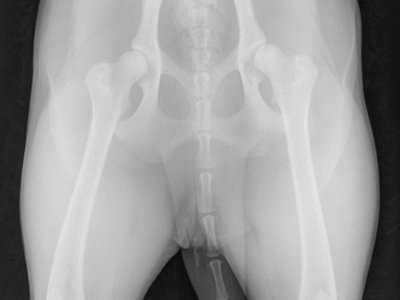
Symptoms
- The gradual decrease in activity
- Limited stretching of the body
- Frailty in the hind or rear legs
- Loose joints
- Standing with legs too close to one another
- Scratchy sound of the joints while moving
- Bunny hop walking style
- Body Stiffness
- Pain
- Heavy loss of muscle in the thigh area
- Bulged shoulder muscles occur due to additional pressure on the right foot applied to compensate for the lame hind legs
Causes
- Hereditary disorder
- Malnutrition
- Excess Body Weight
- Excessive or no exercising
Treatment
Non-surgical approach
If a veterinarian feels that the hip dysplasia is only in a mild stage, he/she will give:
- Dietary recommendations
- Physical therapy
- Advise not to exercise on a hard surface
- Anti-inflammatory medications that comprise corticosteroids, aspirin and non-steroidal anti-inflammatory drugs
- Joint fluid modifiers
Surgical approach
- Double or triple pelvic osteotomy – A surgery performed on dogs less than 10 months of age. A selective portion of the pelvic bone is cut off and the segments are rotated. The working of the ball and socket joints will improve due to this surgery.
- Femoral head osteotomy – The surgery can be undertaken on young and mature dogs. In this surgery, the femoral head of the hip joint is removed. This will result in the creation of a false joint that will decrease the inconvenience suffered due to hip dysplasia.
- Total hip replacement – The damaged hip is replaced with an artificial implant in either plastic or metal form. This will allow the hip to function up to the normal range and the earlier pain before surgery will not recur.
2. Allergic (or) Atopic Dermatitis
Symptoms
The affected dog will involve in itching, rubbing, scratching and licking its body areas like face, underarms, and paws.
Causes
- Family history
- House dust mites
- Indoor and Outdoor spores
- Animal danders
- Airborne pollens
Treatment
Based on the cause of the allergic reaction to the dog, the relevant treatment will be undertaken. In the case of atopy, the veterinarian will perform hyposensitization therapy and he will give anti-allergen injections (to relieve the dog from the allergens that cause allergy).
The problems like itchiness will gradually lower. However, the veterinarian can even recommend antihistamine and corticosteroids.
Cyclosporine is a drug given to a dog that is suffering from skin allergies for a long time. The power of this drug lies in largely reducing the itching sensation that arises due to an allergy.
3. Addison’s disease
Symptoms
- Laziness
- Head shaking
- Loss of appetite
- Weight Loss
- Vomiting
- Diarrhea
- Dehydration or more thirst
- The abnormal frequency of urination
- Uneven heart rate and weak pulse rate
- Abdominal pain
- Lower body temperature
- Alopecia
- Low blood sugar
- Skin hyperpigmentation
- Collapse
Causes
- The immune system of a body attacks its own tissues
- Adrenal gland failure
- Pituitary gland fails to secrete adrenocorticotropic hormone. This hormone activates the adrenal gland
- Hypothalamus might not be able to produce adrenal gland controlling hormones
- Medications taken by a dog for Cushing’s disease might disturb the normal production of adrenal gland hormones leading to underproduction
- Dogs on steroids medications could develop Addison’s disease if they suddenly stop those medications
Treatment
There is no permanent cure found yet for Addison’s disease. Suppose an affected dog collapses suddenly then immediate hospitalization and severe therapy must be immediately done.
Intravenous fluids and corrective hormonal supplements will be given by a veterinarian for such dog to correct the deficiencies.
Likewise, drugs like Florinef (given twice in a day) and DOCP injection to the affected dog once every 25 days also yield good results. Supplemental medications could be given by the veterinarian.
Regular and proper treatment coupled with continual monitoring of a dog with Addison’s disease will increase the lifespan of the affected dog. The lifespan of an affected dog can become similar to that of a normal dog.
4. Progressive Retinal Atrophy
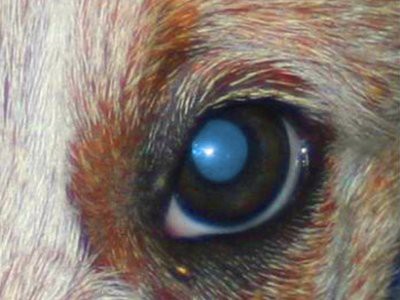
Symptoms
- Cloudy appearance on the surface of the affected dog’s eyes
- Night blindness
- Eye colors turn greyish with a slight shine occurring at intermittently
- The dog shows reluctance to climb the stairs and move down the steps
- Bumping on or falling over objects
- Reduction in the color pigmentation on the eyes
- Cataract formation
- Enlarged pupils on both the eyes
Causes
- Genetic disorder
- The autosomal recessive gene that a parent possesses wherein this can produce puppies affected by PRA despite the parents being normal
Treatment
Since the nature of this disease is hereditary, a cure is not possible. Medications or surgeries are only found to develop complications or they remain inconclusive in their results.
The problem is that Progressive retinal dystrophy is always diagnosable only when it is in the advanced stage.
5. Glaucoma
Symptoms
- Disinterest in doing daily activities
- Loss of Appetite
- Squinting
- Rubbing the eye on the ground or some furniture
Causes
- Infection on one or both the eyes
- Formation of Tumor
- Cataract development on the retina
- Inflammation in the eyes
- Chronically displaced retina
Treatment
The veterinarian will instruct the owner of an affected dog to follow some vital steps for avoiding complications to the dog like:
- Decrease the amount of aqueous humor fluid that the eye produces – A combined treatment method to avoid excess production of aqueous humor fluid is recommended by a vet to a dog owner.
Pills, eye drops, and band-aid methods are useful but not very effective in the long-term. The dog owner needs to utilize the best combination of treatment methods to save his/her dog’s vision. - Avoid the dog from becoming excessively stressed – Like humans, the immune system of dogs will not work properly if it is under extreme stress.
- Utilization of a harness – Veterinarians usually recommend Harness for walking dogs since collars will cause excessive pressure on the jugular veins of a dog. This pressure will trigger glaucoma.
- Apply chemical ablation – If the dog’s health or age does not allow for the application of anesthesia, chemical ablation could be applied.
However, if restoration of vision is possible, then laser surgery will be effective in regulating intraocular pressure - Treat an affected eye well in advance before it loses its vision power – It is best to detect glaucoma at a very early stage or else there’s no use in treating a blind eye.
Expensive drugs, therapies, and tests will do no good and will only harm your livelihood. Remove the blind eye to avoid inconvenience and pain.
6. Gastric Torsion
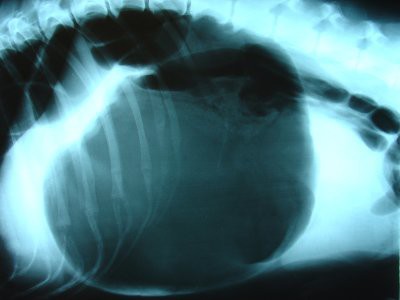
Symptoms
- Displaced Abdomen
- Inability to vomit or belch
- Shortness of breath
- Overall body weakness
- Excess Drooling
- Pale gums
- Body Temperature becomes cool
- Speedy heartbeat
- Collapse
Causes
- Accumulation of gas or food in the stomach
- Genetic factor
- Abnormally fast eating
- Overdrinking
- Overeating
- Heavy exercising after eating
- Pain
Treatment
Generally, a veterinarian will begin treatment for gastric torsion in dogs by doing gastric decompression and fluid infusion to mitigate the shock effect. The vet will wait for the dog’s stomach to come back to a normal position after these procedures.
In case if there is still a problem, the veterinarian will undertake gastropexy. Gastropexy is a surgery that involves bringing the stomach to its natural position by suturing the stomach to the abdominal wall.
Von Willebrand Disease II
This is a genetic bleeding disorder that affects many dogs. They have a very low blood clotting determinant called Von Willebrand coagulation factor. Goldendoodles are more prone to this disease like their parent poodles.
Goldendoodle Price And Breeders
The price of a puppy depends on the location, pedigree, vaccination details, and the age of the pet.
Dogs purchased from reputed breeders come at a price tag of $1500 to $5000. Some breeders may even charge premium prices i.e. higher than the specified range. You can approach reputed dog adoption centers for this doodle puppies.
In the United Kingdom, the price of a well-bred Goldendoodle dog can be from £400 to £900.
Goldendoodle Breeders in the USA
- Abbey Acres Goldendoodles
Address: Valentin Rd, Galt, CA 95632
Tel.: +1 916-687-4744
Tel. (Mob): (916) 230-2655
E-mail Id: Trish@AbbeyAcres.com - Empire Puppies
Address: 164-13 Northern Blvd
Flushing, NY 11358
Tel.: +1 718-321-1977
E-mail Id: empirepuppies@yahoo.com - Pine Ridge Goldens
Address: 7033 E Shadywoods Ct
Floral City, FL 34436
Tel.: 1 727-485-5562
Goldendoodle Breeders in the UK
- Kizza Bella Doodles
Address: South Fen View, Fenside Road
Spilsby Lincolnshire PE23 5DB
Tel.: 07434721213
E-mail Id: kizzabelladoodles@yahoo.co.uk - Northcroft Doodles
Address: Driffield, East Riding of Yorkshire
Tel.: 07941678549
E-mail Id: northcroftdoodles@icloud.com - Razzlin Goldendoodles
Address: Near J1/J30 M25, Essex
Tel.: 01375 640878

